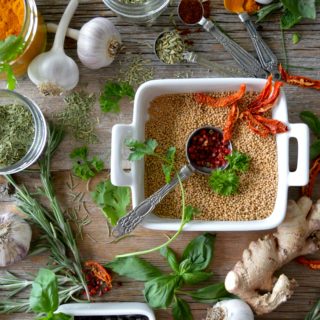18 Common Spices and Herbs and their Health Benefits

Herbs and spices are not only stellar for flavoring your favorite foods, but many also have outstanding health benefits.
In addition to adding flavor and nutrients to recipes, herbs and spices contain a variety of compounds that may help reduce inflammation, boost your immunity, control blood sugar, improve symptoms of certain medical conditions, and protect against the development of chronic diseases.
Here are common herbs and spices and their benefits.
-
Ginger

Ginger is the rhizome—a horizontal, underground stem—of the Zingiber officinale plant. It has a warm and spicy flavor and is commonly added to dishes like soups, baked goods, and curries.
Ginger contains multiple bioactive compounds, including gingerols, shogaols, and paradols, which have anti-inflammatory and antioxidant effects in the body.
It may help to soothe nausea, fight arthritis pain, soothe pain.
Ginger can be taken in tea, smoothies, vegetable dishes, salad dressings, meat dishes and soups.
-
Cumin

Cumin is a popular cooking spice used for its aromatic effects. Studies show that it is also beneficial for weight loss, cholesterol, stress management, and more. It also has high antioxidant potential.
-
Parsley

This herb is full of antioxidants, carotenoids, and other beneficial vitamins that support a healthy body and immune system.
Parsley is full of antioxidants which are essential in helping to fight off colds. This simple herb is more than just a garnish for your food, it can help reduce inflammation and also boasts essential nutrients like calcium, iron and vitamins K, C, and A.
Used in garnishing most dishes and salads.
-
Cinnamon

This spice is packed with health-promoting compounds such as cinnamaldehyde coumarin, cinnamic acid, and eugenol, all of which have potent antioxidant and anti-inflammatory properties.
Lowers blood sugar levels and has a powerful anti-diabetic effect.
Cinnamon has potent antioxidant activity, helps fight inflammation and has been shown to lower cholesterol and triglycerides in the blood.
Cinnamon can lower blood sugar by several mechanisms, including by slowing the breakdown of carbs in the digestive tract and improving insulin sensitivity.
It’s warm, spicy flavor can be found in drinks like apple cider and in baked goods like cookies, pumpkin pie, and sweet bread.
-
Peppermint

Relieves irritable bowel syndrome (IBS) pain and may reduce nausea.
Research shows that as a holistic remedy, peppermint is also effective in improving cardiovascular (heart) and pulmonary (lung) health by acting as a bronchodilator. Bronchodilators work by widening air passages (bronchioles) in the lungs. By inhaling the smell of peppermint, a person will also increase their nasal air force, in turn supplying more air to the lungs.
In addition, some studies also show that peppermint is an effective muscle relaxer thanks to its cooling menthol compound, which is why menthol is often an active ingredient in ointments and creams that target muscle pain.
Peppermint in aromatherapy may help fight nausea.
You can use peppermint in smoothies, fresh juices
-
Cloves

Cloves are valued as a sweet aromatic spice that provides warmth and flavor to various recipes.
Cloves are also a great source of beta carotene, which is what gives them their rich, dark brown color. In the body, beta carotene is converted into vitamin A, an important nutrient for keeping our eyes healthy.
May help reduce arthritis risk, decrease oxidative stress, support eye health.

Protect against cognitive decline, cancer and mood disorders.
You’ll find these dried seeds of the cilantro plant in sausages and curries, soups and stews. The compound of note in coriander is linalool, an antioxidant that may have anti-cancer properties and may protect the brain from diseases of cognitive degeneration.
Used for garnishing most dishes and salads.
-
Oregano

Oregano belongs to the mint, or lamiaceae, plant family and has a robust and earthy flavor. These tiny but mighty leaves boast many nutrients, including vitamins K and E, calcium, iron, manganese and fiber.
Oregano is rich in antioxidants—specifically, carvacrol and thymol. Carvacrol is the most abundant compound in oregano and has been shown to help stop the growth of several different types of bacteria. Thymol is a natural antifungal component that helps support the immune system by enhancing the production of antibodies.
May help reduce inflammation, fight infections strengthening the immune system against infections, improving insulin resistance.
Add fresh oregano to salads and pasta dishes, and use dried oregano to flavor sauces, dressings, and roast chicken.
-
Paprika

Paprika is part of the capsicum family of peppers, which includes sweet bell peppers, hot green peppers, hot red peppers, and several other varieties.
Paprika may be best known for adding a pop of color to dishes, but it also contains capsaicin, a compound found in peppers that has been shown to have antioxidant and anti-inflammatory effects. Capsaicin is well known for its pain-relieving properties.
It has 37 percent of the recommended daily intake of vitamin A, and it also contains some iron.
Enjoy this healthy spice in soups and stews to add a smoky note or as a garnish for foods like deviled eggs or potato salad. It’s also great in a marinade or spice rub.
May help decrease inflammation and pain.
-
Chili peppers

Fresh, dried, or powdered, chilies will give your food a kick. They also may boost your metabolism and help keep blood vessels healthy. One possible reason is capsaicin, the compound that makes them spicy.
-
Cardamom

Cardamom contains active ingredients such as phenolic compounds and volatile oils which have antioxidant, anti-inflammatory, blood pressure-lowering, and antidiabetic effects.
Cardamom may treat constipation, colic, diarrhoea, vomiting, headache.
Cardamom pairs well with both sweet and savory flavors and can be added to dishes like curries, baked goods, and meat dishes as well as tea, coffee and desserts.
-
Turmeric

Turmeric is the spice that gives curry its yellow color. Contains curcumin, a Substance with powerful anti-inflammatory effects.
Turmeric may be effective for treating medical conditions like osteoarthritis, ulcerative colitis, and type 2 diabetes.
Try adding turmeric to dishes like curries and soups. Adding black pepper to turmeric recipes can significantly increase the bioavailability of curcumin.
-
Cayenne Pepper

Cayenne pepper is a type of chili pepper used to prepare spicy dishes.
Contains capsaicin, which has been shown to reduce appetite, increase fat burning and may have anti-cancer properties.
-
Rosemary

The active ingredient in rosemary is called rosmarinic acid.
This substance has been shown to suppress allergic responses and nasal congestion. Other studies have also shown that rosemary supplements could be helpful for treating depression.
You can make a relaxing tea with fresh or dried rosemary, lemon juice, and honey. Good also in making soups and meat dishes.
-
Black Pepper

Piperine, a naturally occurring compound that gives peppercorns their kick, may reduce the risk of certain cancers, including those of the breast, lung, prostate, ovaries and digestive tract.
-
Garlic

Contains a compound called allicin, which is also responsible for garlic’s distinct smell.
Garlic supplementation is well known for combatting sickness, including the common cold and improve heart health.
For those with high cholesterol, garlic supplementation appears to reduce total and/or LDL cholesterol.
-
Nutmeg

Nutmeg has a nutty flavour but truly has its own distinct taste. It is often used for baking, in desserts, in savoury sauces or on cocktails. Nutmeg has detoxifying properties, which is why it is used as an ingredient in many detox drinks. Nutmeg can also be used as a sleep aid and a natural remedy for many everyday digestive problems.
-
Thyme

Thyme gives food an earthy taste but has a mild flavour. It is often used in meatloaf and minced meat dishes as well as soups and stews.
Thyme has strong antioxidant and antimicrobial properties.
Conclusion
Herbs and spices make flavorful additions to meals but are also powerhouses for essential nutrients that greatly benefit the body.
People may experience some benefits or health improvements from incorporating herbs and spices into their diet.
https://www.webmd.com/



